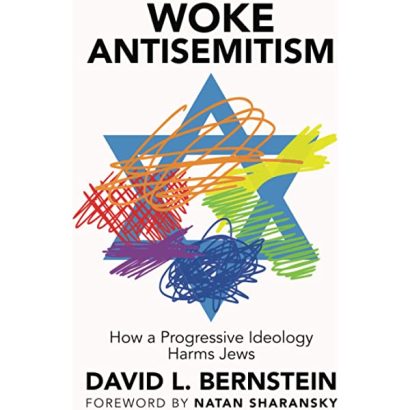This is a very important book. Over the last decade or so, a sweeping ideology that looks much like a new religion has gained tremendous influence over Western governmental, educational, professional and other leading institutions and media. It goes by various names, including ‘Social Justice’ or –because it claims it alone has ‘awakened’ to the nature of societal injustice – ‘wokeness’.[1] Its officiants pronounced its precepts from the institutions they seized and announced that opposing views would not be countenanced because they were harmful to the oppressed. Well-intentioned people sought to adapt: after all, they supported social justice. They also saw that bad things happened to those who even questioned the new beliefs. Soon there seemed to be huge enthusiasm for greater diversity in terms of racial or other demographic identities, but a curious absence when it came to diversity of views. Woke had won.
Bernstein’s book is, as far as I know, the first to not only explicitly decry woke ideology as a threat to liberal (as opposed to illiberal) values but to also explain how it inevitably fosters antisemitism. In a powerful foreword, Natan Sharansky describes the unease of many emigres from the former USSR who, like him, see woke ideology as ‘reminiscent of the totalitarian ideology they grew up with.’ Sharansky recalls the ignominious Soviet ‘doublethinkers’ who pretended to believe things they didn’t, and warns that the freedom of expression people enjoy in the United States only exists if they are willing to risk being bullied. American Jews must, he concludes, ‘stand up for independent thought and the liberal principles on which the democracies of the world were founded.’ ‘Woke ideology,’ he goes on, ‘is genuinely dangerous for Jews, for society, and for the world.’
Bernstein makes the latter argument brilliantly, illustrating it with pertinent anecdotes from his personal and professional life in progressive circles. His account is limited to the United States, but readers in other countries will recognise the increasingly shrill tribalist politics, the suppression of opposing views, and the particular nature of the left antisemitism he describes. He briefly sketches his childhood as the son of an Iraqi immigrant mother and third-generation Ashkenazi father, who was taught to honour the Jewish tradition for discussion and debate; and contrasts the ACLU’s 1978 defence of the Nazis’ right to march in Skokie – a defence which, as a boy, he supported – to today, when the ACLU ‘only defends speech it approves of.’ He remembers the antisemitism that assailed him growing up and how he benefited from going to school with black children. During his university years he encountered both antisemitism as a pro-Israel advocate and the ‘early iterations of woke ideology’ – what was then termed ‘political correctness’. He recalls the rush of optimism that he and so many other Jews felt in the 1990s with the collapse of the Soviet Union and Oslo Accords.
Then the peace talks collapsed, and in 2001 along came Durban, a sickening spectacle of resurgent left antisemitism. Looking back, Bernstein makes a very important point. He notes that many, including him, saw Durban as ushering in a ‘New Antisemitism’ characterised by extreme hostility to Israel. Yet these critiques failed to address ‘the underlying ideology plaguing the Durban conference – one with which many of the Westerners and even Jews in attendance no doubt supported’. This was postcolonialism: a seemingly ‘complete and inviolable explanation for why some countries flourish and others languish’. Postcolonialism contains important truths, Bernstein argues, but activists have turned it into dogma that simplistically divides the world into oppressors and oppressed, morally culpable and morally pure. This binary ‘enables the expression of the usual resentment and ill-will toward Jews and Israel, both of whom have succeeded in their respective environments’.
Meanwhile a broadly equivalent view of race was taking hold in American progressive circles. As a director of the American Jewish Committee who was particularly active in trying to strengthen Jewish-black relations, then as executive director of the David Project which focused on campuses, Bernstein was in a sometimes-excruciating position to witness this paradigmatic shift at first hand. He describes his consternation at a regional leadership meeting, where the organiser and attendees of a ‘multiculturalism’ workshop pounced on him for failing to appreciate ‘a terrible film’ ostensibly about racism, and found that ‘I, the swarthy son of an Iraqi Jewish immigrant who never saw himself as white, was the white guy’ implicitly responsible for racism. Over subsequent years coercive ‘diversity training’ gained ground, drawing on a simplified rendition of academic theories about ‘power.’
Bernstein described the dogma in an opinion piece in 2003:
Progressive ideologues believe that only people with power can be racists. Under this winner-take-all power paradigm, the formula is ‘racism=bigotry + power,’ which means that you cannot be a racist if you don’t have power, and if you do have power, you cannot be a victim. Over time, progressives have come to view Jews as a privileged group and part of the American power establishment, and this lends little credence to Jewish claims of racism. So when Jews allege racism by Arabs or Muslims, or African Americans, progressives tend to remain conspicuously silent because, in their view, Jews cannot be victims, and ‘powerless’ minority groups cannot be guilty of racism.
There was a clear progression from not taking antisemitism seriously to believing that Jews’ inordinate power implicitly justified antisemitism. The American left was being, Bernstein now writes, ‘Durbanized’.
With the rise of Black Lives Matter, Bernstein started hearing black Jews claim white Jews benefited from white supremacy and needed to shed their whiteness. BLM activists accused Jews of ‘decentring the black experience’ and detracting from their claims. Some accused Israel of committing genocide. In 2016, Bernstein was startled by a BLM meeting where participants intoned ‘I was blind but now I am Woke’, finishing ‘Amen’. The ecclesiastical overtones were not incidental. He was witnessing the birth of an all-explanatory worldview, one that embraces dogma and treats challenges as heresy. Jewish leaders struggled to respond, wondering if they could still make common cause with the movement.
The year 2020 is evoked in a chapter titled ‘When Everyone Lost Their Minds.’ The American ‘reckoning about race’ following the murder of George Floyd was characterised by frenzied declarations of white privilege, performative displays of ‘taking the knee’ and even more intense dogmatism. Bernstein was troubled to see Jewish advocacy organisations offering unconditional support to BLM – including its violent protests and calls to Defund the Police – and demanding others follow suit. The Jewish community was, he feared, ‘morally adrift’ and deferring to the moral authority of others.
He started reading heterodox black thinkers like John McWhorter, whose Woke Racism brilliantly details how woke ideology harms black Americans. Now head of the Jewish Council for Public Affairs, Bernstein wanted to introduce thinkers like McWhorter but knew he’d be castigated and might even be accused of platforming racists. Only those who ‘toed the party line’ were allowed to speak on race, he writes, giving a false impression a black consensus existed. In giving in to the censorial climate, however reluctantly, Bernstein wondered if he was one of Sharansky’s ‘doublethinkers’.
In 2021 he left the JCPA, announcing that he wanted to dedicate himself to advancing classical liberal values. He wrote:
While I continue to believe deeply in social justice, I am very concerned about the rise of ‘critical social justice,’ out of which grows cancel culture. … Cancel culture sounds like it would be a raucous affair. But its primary sound is silence. That won’t change until more of us who believe in free discourse speak out.
A few months later Bernstein, Rabbi David Wolpe, Bari Weiss, Bret Stephens, Pamela Paresky and Monica Osborne issued ‘A Letter to Our Fellow Jews on Equality and Liberal Values’. This became the defining manifesto of the Jewish Institute for Liberal Values, founded by Bernstein a few months later.
Bernstein describes the JILV’s difficult first months being smeared by mainstream left-leaning Jewish organisations and media as a right-wing venture. Arno Rosenfeld of the Jewish Forward claimed the JILV was funded by a ‘Republican megadonor,’ with sinister suggestions of ‘dark money’ and ‘questionable partners’. A JILV Open Letter expressing concerns about woke antiracist ideology in Maryland Jewish day schools was declared ‘racist’ and removed by administrators of a Jewish educators’ Facebook group. A letter signed by 250 rabbis sympathetic to the JILV decried the constricting of speech around issues like race and gender; the signatories were denounced for ‘calling for space for bigoted & oppressive views.’
People respond this way when the institutions they trust begin to, as Bernstein puts it, ‘adopt someone else’s prepackaged reality’. This is part of what it means to be ideologically captured. He calls out the Anti-Defamation League in particular for ‘slouching toward wokeness’, citing for example its recent history of denouncing all critics of Critical Race Theory or CRT-derived school curricula as fear-mongering racist extremists. In this way the ADL lumps reasonable, manifestly nonracist concerns about woke race ideology with bigotry, leading to further division and the stifling of moderate critical voices. Bernstein, a longtime admirer of the ADL, writes: ‘The ADL seems to have entirely missed the obvious connection between the spread of illiberal ideology on the left and the growth of a new variant of Progressive antisemitism that insists that Jews are all-powerful and oppressive.’ He notes that the ADL has recently indicated they are reviewing their stance: ‘an excellent first step.’
I doubt that many of us who adhere to the left can claim never to have been a doublethinker in these febrile times – out of confusion, cowardice, a desire not to hurt ‘our side’ when we think the other side is the greater threat, or a combination of factors. The point is to learn and do better. I for one look forward to lending my support to the JILV.
Bernstein has written a comprehensive description of an ideology which is strangling classical liberal values and a warning about the threat it presents to Jews directly. The book is a resounding call for courage. It should be widely read and discussed and its core principles put into action. In writing it, Bernstein has done a great service.
[1] See Helen Pluckhurst and James Lindsey (2021) Cynical Theory: How Activist Scholarship Made Everything about Race, Gender and Identity – and Why This Harms Everything, Swift Press.



































